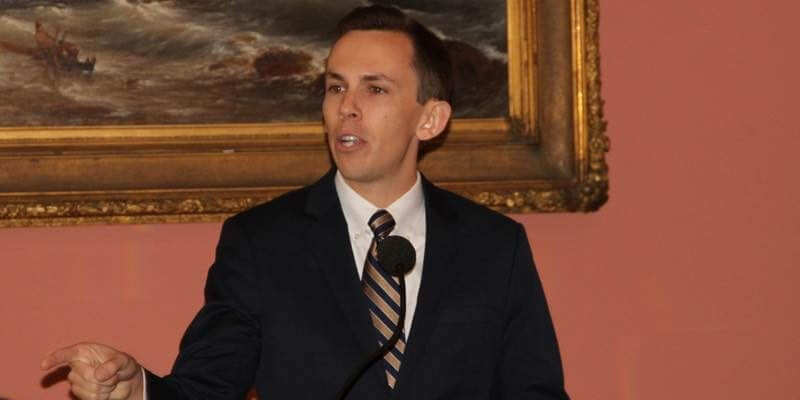Embattled welfare group paid $5 million for new USM volleyball center
Embattled welfare group paid $5 million for new USM volleyball center
by Anna Wolfe, Mississippi Today
February 27, 2020

Why did a welfare organization pay $5 million to build a volleyball stadium?
Mississippi gave a politically connected nonprofit nearly $65 million in few-strings-attached welfare dollars. It seemed to fund anything but assistance for the poor — including pet projects for sports figures.
By Anna Wolfe
John Jones doesn’t play volleyball.
The elderly construction worker mostly bides his time during the cold, rainy months — the slow season for his employer, which builds swimming pools. Right now, Jones can’t afford to turn on the electricity or water at his downtown Hattiesburg home. Every time he visits the local utility assistance agency, he said, “They keep giving me the run around.”
And yet, three miles west of his deteriorating neighborhood, a nonprofit funded by federal welfare dollars paid $5 million in cash to build a state-of-the-art volleyball facility on the University of Southern Mississippi campus.
The nonprofit said it would serve the poor.
“How in the world is the volleyball court going to help struggling families? How does that help them get the job training they need?” said Oleta Fitzgerald, longtime director of the Children Defense Fund’s Southern Regional Office.
A college town of 46,500 people, Hattiesburg has a poverty rate almost double the state average, despite having a lower unemployment rate.
“They didn’t even make a good attempt to connect this money to the needs of these families,” Fitzgerald said.
The Mississippi Community Education Center, a nonprofit that receives a majority of its budget from taxpayer dollars intended to help people out of poverty, provided most of the funding for the volleyball center through an upfront five-year sublease agreement with the University’s athletic foundation. The nonprofit owner, Nancy New, sat on the athletic foundation’s board. The university modified plans to the facility, called the Wellness Center, so that it would include office space for the organization.
One of the university’s celebrated alumni, former NFL quarterback Brett Favre, was credited in local news reports with raising funds to build the $7 million center. Favre’s daughter plays volleyball at Southern, this year on the beach volleyball team. University spokesperson James Coll said in a statement that individual donors, in addition to the $5 million from the nonprofit, contributed to the construction.

Under the 2017 lease agreement, obtained by Mississippi Today, the Mississippi Community Education Center rented all university athletic facilities “for various activities that benefit the area’s underserved population,” but one former employee said that never happened and by Thursday, after over a week of inquiry, the university had still not explained what the nonprofit accomplished on campus.
The nonprofit, under ongoing investigation in connection with the largest public embezzlement scheme in state history, has now closed its offices.
The organization’s expansion began shortly after John Davis, a longtime Mississippi Department of Human Services official, became the agency’s director in 2016. That year, expenditure reports show, the department began issuing multi-million dollar lump sum payments to the Mississippi Community Education Center, the nonprofit founded by politically connected private education contractor Nancy New.
However, Davis did not make New report how her organization spent the money — now more than $65 million since 2016, according to a review of state agency expenditure reports.
“They’re taking from the needy and giving it to people that don’t need it. That’s what it is,” Jones said.
New’s nonprofit did not give direct assistance to working folks like Jones, but offered parenting and fatherhood classes, motivational speaking events with retired athletes and even a boot camp-style fitness program run by Paul Lacoste. The nonprofit contracted with another of New’s companies, New Learning Resources Online, to provide online diploma programs to its partners, such as Phoenix Project.

[Read all of our coverage on Mississippi welfare.]
In early February, agents from the Mississippi auditor’s office arrested Davis, New and four others in connection with a conspiracy to steal more than $4 million in grant funds meant to serve the poor. They’ve pleaded not guilty.
The alleged theft would explain what happened to just 7 percent of all funds Human Services gave the nonprofit since 2016. The state has very little accounting to show what happened to the rest.
Most of the money came from a federal welfare program called Temporary Assistance for Needy Families, which the federal government provides each state through a block grant for them to use as they wish — with few strings attached. Out of $135 million in 2018, Mississippi spent just five percent, or $7.3 million, on direct cash assistance to poor families.
That year, Human Services gave six times that amount, almost $44 million, to Mississippi Community Education Center and another nonprofit, Family Resource Center of Northeast Mississippi, which together called their statewide outreach services “Families First for Mississippi.”
The state did not enforce a provision in their state agreement to submit financial reports, especially with respect to the subgrants the nonprofits issued to other entities, including other public agencies like public school districts and community colleges. The outcome reports the state compiled from each nonprofit’s submitted data, which were meant to show how many people they served, contained nonsensical figures.
The Family Resource Center has not been included in any criminal charges but the state did freeze funds to the organization in the aftermath of the arrests. The director of that organization, Christi Webb, did not return several calls from Mississippi Today.
New did not return several calls to her cell phone and Mississippi Community Education Center programmatic director Steve Pickering did not respond by Thursday afternoon.
U.S. Congressman Bennie Thompson told Mississippi Today he is preparing to send a letter to the U.S. Department of Health and Human Services, which administers Temporary Assistance for Needy Families funds federally, to ask that the agency review all expenditures under Mississippi’s program to determine if the state used the funds as intended.
In late 2019, after Gov. Phil Bryant appointed a former FBI agent to head Human Services, the department revised its subgrantee manual and began requiring a competitive bid process for welfare subgrants to prevent abuse. Human Services released a video statement Thursday stressing that the agency employees who reported the fraud are now spearheading changes “to make sure these actions never happen again and the money goes to the people who need it,” said Danny Blanton, a spokesperson for the agency.
As the state doled out money to subgrantees with little accountability, it approved fewer and fewer families for direct assistance. The program served less than 4 percent of children living in poverty in 2018.
“We just beat down poor families with children who are struggling trying to make a living and these resources could’ve helped them to really get a foothold in an economic way, with child care and real job training,” Fitzgerald said.
Wardette Price Jr., who lives a few miles southeast of campus, approached the local welfare agency, Pearl River Valley Opportunity Inc., a few years ago seeking help to find a place to live in order to get his daughter back from Child Protection Services. “I was in tears … I begged them, please, can you help me?”
“You’re on the waiting list,” he said the agency told him. “So, I lost her.” Price, who has a disability, hasn’t seen his daughter in five years.
The average two bedroom apartment in Hattiesburg is $768 monthly, according to the National Low Income Housing Coalition’s 2019 “Out of Reach” report. To afford one, a person working full time would have to earn $14.77 an hour, more than double minimum wage.
Downtown resident Angela Todd wondered if the large abandoned blue building across from her house on 7th Street could have been renovated to provide shelter for the area’s homeless people.
“How many beds do you imagine they could put in there if they would have fixed it up? $5 million could have went towards a lot of stuff,” she said.
Todd received direct cash assistance, $144 a month, many years ago when her three children were young. Today, she only receives food assistance, but because of a miscommunication within her recent recertification, she said she doesn’t think the state will issue her benefits next month.

In November of 2016, Human Services made the first large, lump sum welfare payment on record — of $4.9 million — to Mississippi Community Education Center. Together the entities were operating under a subgrantee agreement of $1 million originally, but the nonprofit would receive at least $13 million in these advanced payments by the time the agency issued a new contract. Typically, vendors for the welfare program submit claims for reimbursement as opposed to receiving upfront payments, several subgrantees told Mississippi Today, making this arrangement all the more unusual.
By the following October, Davis had signed a $21.5 million subgrant agreement with the nonprofit and sent payment of $3.5 million on Oct. 20, 2017.
Six days later, New paid $5 million up front in cash to the University of Southern Mississippi Athletic Foundation to rent all athletic facilities at her alma mater. She had sat on the foundation board during the 2016-2017 year. The five-year lease agreement said that the nonprofit “serves as a statewide family and community outreach initiative and requires access to facilities in the University’s area.”
“They didn’t really offer programming on campus,” Meghan Burke, the former media coordinator for Mississippi Community Education Center’s Hattiesburg office from 2017 to 2019, said in a Facebook message to a Mississippi Today reporter. “They only went in to teach a few classes like financial literacy to college students but that was it.”
Representatives from five local nonprofits that deliver similar services, including the Boys and Girls Club, echoed Burke, telling Mississippi Today they had also not heard that the nonprofit provided programming at University athletic facilities.
“Nobody has any idea anything about that,” Blanton said when asked about the family outreach delivered at the university athletic facilities. “Nobody had any visibility on anything about a volleyball center.”
“That’s the problem when you don’t go through the RFP process,” he said.
Coll said in a statement that University and outside counsel, the attorney general’s office and the Institutes for Higher Learning board all approved the Wellness Center agreement. He added it is unlikely Mississippi Community Education Center will remain a partner.
“The Southern Miss Athletic Foundation is looking forward to initiating conversations with the appropriate state agency and leaders about how its athletics facilities, including the Wellness Center, can be used to the benefit of Mississippi families and individuals in the spirit of the original agreement,” the statement said.
The volleyball center’s development sheds new light on the relationship between Nancy New, her nonprofit and former NFL star and Mississippi native Brett Favre.
A January Associated Press story discusses Favre’s role in the new volleyball facility. “It’s hard to get people to donate for volleyball. But we’ll be opening an $8 million facility that will be as good as any in the country at Southern Mississippi,” he said in the article.
The Mississippi Community Education Center also allegedly gave $2.15 million of Mississippi welfare money to a concussion research and medical device company called Prevacus and its affiliate PreSolMD, according to the indictments against New and her son Zach New.
Favre invested in Prevacus, sat on its advisory board in 2014 and has publicly endorsed the company, according to Prevacus releases and news reports.
The company developed a nasal spray which, when used after a brain injury, stimulates brain cells through neurosteroids to reduce swelling, according to its website. PreSolMD, a similar cream that deters the impact of concussions, was to be released in December, according to a Facebook post by spine research company SpineMark Corporation, one of the only references to the company online.
Favre, who suffered concussions during his career, has vocalized concerns about the long lasting impacts of the common sports injury and even recruited other high-profile athletes to join him in backing Prevacus.
Favre, his agent Bus Cook, who also sat on Prevacus’ advisory board, and Prevacus and PreSolMD founder Dr. Jake Vanlandingham did not respond to several calls and text messages from Mississippi Today.
State Auditor Shad White, who continues to investigate the welfare scheme he called a “sprawling conspiracy,” said he was aware of these connections but could not comment further on the direction of the investigation. Hinds County District Attorney Jody Owens, who is prosecuting the case, told Mississippi Today his office is interested in any instances where money intended to serve the poor was used for other purposes.
University officials, including spokesperson Coll and athletic director Jeremy McClain, did not answer or return several phone calls or respond to requests for interviews about the volleyball center’s funding or Mississippi Community Education Center’s presence on campus. The athletic director at the time of the lease agreement, Jon Gilbert, one of the only people “that would have had the most direct involvement in the lease agreement,” Coll said in an email, and now director of athletics for East Carolina University, directed questions to Coll. Leigh Breal, who signed the agreement on behalf of the athletic foundation, did not return calls or messages.
Mississippi Community Education Center’s Internal Revenue financial form shows it had revenues of $26.7 million in government grants in 2017, the most recent year available, up from $13 million in 2016 and $2.5 million in 2015.
“It is very difficult to believe that someone received that big of a bump in resources and political patronage and the governor’s office would not have known about that,” Fitzgerald said.
The financial report also says the organization ran a $5 million bingo operation — through which it reported a $23,099 loss. The nonprofit’s website lists an office at an Iuka bingo hall called Northpoint Bingo.
This article first appeared on Mississippi Today and is republished here under a Creative Commons license.






